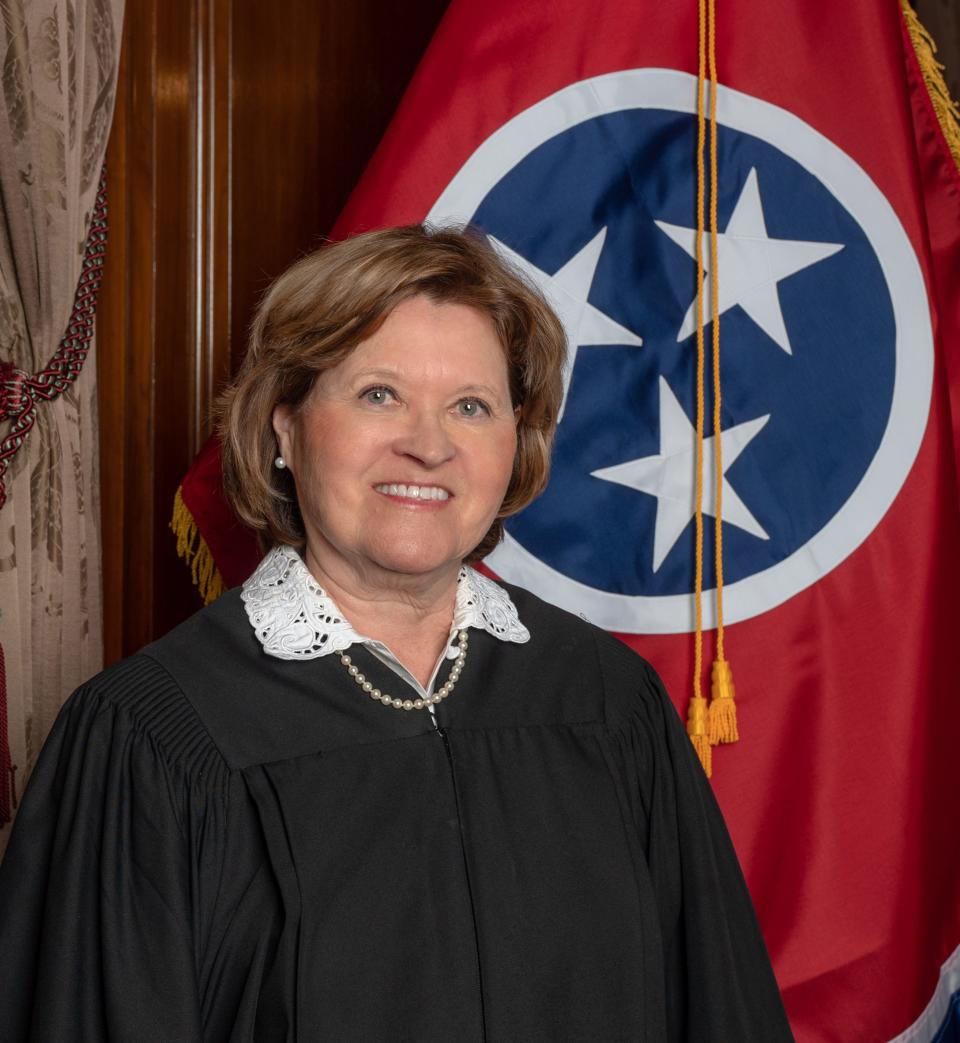Tennessee Supreme Court Justice Sharon Lee's portrait unveiling set | Georgiana Vines
- Oops!Something went wrong.Please try again later.
- Oops!Something went wrong.Please try again later.
- Oops!Something went wrong.Please try again later.
Retiring Tennessee Supreme Court Justice Sharon Lee will be the first woman to have a portrait hung in the courtroom of the Supreme Court when hers is unveiled at 3 p.m. Aug. 24 in Knoxville.
The portrait unveiling in the courtroom of the Tennessee Supreme Court Building, 505 Main St., coincides with the 103rd anniversary in August of the ratification of the 19th Amendment, which gave women the right to vote. The official date of the ratification was Aug. 26, 1920, with Tennessee being the last state needed for the amendment to pass and become law.
Lee, 69, has served 19 years in the Tennessee judiciary, first on the Court of Appeals and then the state Supreme Court. She was chief justice in 2014-16. She was appointed initially by then-Democratic Gov. Phil Bredesen and was retained by voters in elections thereafter. She has made history as a dissenter, with the Knoxville Bar Association featuring her work in a 2017 story, ”Justice Sharon G. Lee and the Power of Dissenting Opinions.”

The Knoxville Bar Association and the East Tennessee Lawyers' Association for Women are hosting the unveiling and a retirement celebration.
Lee said a portrait of Martha Craig “Cissy” Daughtrey, who in 1990 was the first woman named a justice to the Tennessee Supreme Court, hangs outside the courtroom at the state Supreme Court Building in Nashville. Daughtrey now is senior U.S. Circuit Judge for the 6th Circuit of the U.S. Court of Appeals.
What happens in the next chapter of Lee’s life hasn’t been decided, she said.
“Right now I’m focused on getting work finished for the court. I hope to take about six months and, during that time, decide what to do. Once I sit around for about a month I may be desperate to do something,” she said, laughing.
She plans to spend time with her two married daughters and three grandchildren, she said.
Lee is from Madisonville, where she had a practice for 26 years, including with her well-known uncle, the late J.D. Lee, and served as municipal judge. Her parents, Charles and Judith Lee, were active in Democratic politics in Monroe County and held public offices there. The retiring justice now lives in Knoxville.
Besides the Knoxville celebration, a reception for Lee will be held in Nashville, and the Bradley County Bar Association is hosting a dinner at the Museum at Five Points, a local history museum in Cleveland, to which lawyers, court officials and others in Bradley, McMinn, Polk, Monroe and surrounding counties are being invited.

Her successor will be Knoxville lawyer Dwight Tarwater, appointed by Gov. Bill Lee (no relation to Sharon Lee) and confirmed by the state legislature earlier this year. The governor will administer the oath to Tarwater at 3 p.m. Sept. 5 in the Tennessee Theatre, with a reception to follow. Tarwater served as general counsel to former Republican Gov. Bill Haslam.
∎ NATIONAL PARKS BUDGET BEING SLASHED IN HOUSE: The Republican-dominated U.S. House Committee on Appropriations has recommended a 2024 budget for the U.S. Department of the Interior – of which the National Park Service is a bureau – at a much reduced level from this year’s appropriations. The party-line vote on Wednesday was 33-27.Park supporters, including those for the Great Smoky Mountains National Park, the most-visited park in the country, have responded to a plea from the National Parks Conservation Association to “make noise to your members of Congress on the harmful impacts of this bill to the parks, forests, refuges and programs you and your organization care about.”
Phil Francis of Sevierville, retired superintendent of the Blue Ridge Parkway and deputy superintendent and acting superintendent at the Great Smoky Mountains National Park, said the cuts to the National Park Service would be 13%.

“That would be huge,” he said in a statement to this columnist. “When inflationary costs are added to the proposed reduction, it’s my understanding the total loss could be in the neighborhood of 20%-plus.
"For a park like the Smokies or the Blue Ridge Parkway where annual budgets are around $20 million and economic benefits exceed $1B each, that doesn't make sense. Hopefully the Senate will approve more and that the reconciliation process will protect these two most visited Park sites,” said Francis, a former chairman of the Coalition to Protect America’s National Parks, a 2,400-member organization of retired and current employees and volunteers of national parks.
U.S. Rep. Chuck Fleischmann of Ooltewah, who represents the 3rd District from Chattanooga to Oak Ridge, is on the Appropriations Committee and voted with the committee majority for $3 billion for the National Park Service, which is $450 million below 2023's figure.
Fleischmann’s office provided this comment on slashing the Park Service budget: “As Tennessee’s only House appropriator, Congressman Fleischmann understands the need to make hard decisions to limit federal expenditures to curb soaring inflation caused by Democrats’ out-of-control spending. The National Park Service has received $9.5 billion under the Great American Outdoors Act that Rep. Fleischmann voted for, and that was signed into law by President Donald Trump less than three years ago. Before any new money is appropriated or funding levels are increased, the NPS should use the existing taxpayer funds that Congress has provided.”
The proposed bill has what Democrats at a hearing Wednesday described as “poison pills” they tried to eliminate but were unsuccessful. The bill prohibits funds for advancing diversity, equity, inclusion, accessibility and critical race theory.
∎ BAR POLL ON MUNICIPAL JUDGE: The Knoxville Bar Association has released results of a survey of its members evaluating candidates for city of Knoxville municipal judge in the Aug. 29 primary that shows many attorneys participating in the poll do not know the three candidates opposing incumbent John R. Rosson Jr. well enough to rate them. Rosson has been on the bench since 1986. A release said the electronic survey was conducted June 26-July 14.
On a weighted average, Rosson scored 3.27 while Tyler M. Caviness scored 2.9, with Andrew Beamer and Mary L. Ward both scoring 2.28. There were 382 participants, with 65.45% not knowing Beamer well enough to rate him; 54.97%, Caviness; 55.50%, Ward; and 6.81%, Rosson.
The participants were given the following options to rate the candidates: strongly recommend; recommend; do not recommend; strongly do not recommend; and do not know well enough to rate candidate.
Caviness, who is running an aggressive campaign against Rosson, said he was pleased to get the support of 114 respondents compared to 210 who said they didn’t know him well enough to rate him.
As a service to the community, the KBA has developed a “Get To Know Your Judicial Candidates” section on its website to provide information about the candidates running for municipal judge.
A forum for candidates for municipal judge will be held 6:30-8 p.m. July 24 in the fellowship hall at Messiah Lutheran Church, 6900 Kingston Pike. It has been organized by the Knoxville-Knox County League of Women Voters.

∎ RIP: Former Democratic state Sen. Roy Herron, who died at age 69 on July 9 after suffering injuries from a jet ski accident earlier this month, was in Knoxville in mid-June for a book fair held during the annual convention of the Tennessee Bar Association.
I had a chance to visit with him after we bought copies of each other’s books and autographed them. One question I had was whether he planned to run for public office again, since he had served 26 years in the state House and Senate, where he served as the Democratic floor and caucus chair; had unsuccessfully run for Congress in 2010; and then chaired the Tennessee Democratic Party from 2013 to 2015.
He answered by asking if I knew how conservative Blount County was and I said yes. He said former President Donald Trump had gotten more votes in his home county of Wheatley than in Blount County.
In other words, his answer was no, he didn’t intend to seek office again.
In the 2020 election, Trump took Tennessee with 60.7% of the vote while President Joe Biden got just 37.5%. In Weakley County, Trump got 75.7% and in Blount, Trump got 71.1%.
The book I bought that he had written with L.H. “Cotton” Ivy was “Tennessee Political Humor: Some of These Jokes You Voted For,” published by the University of Tennessee Press in 2000. The contents include sections on the legislative, executive and judicial branches as well as other topics.
“Be sure to read the stories on the judicial branch,” he said. The introduction to “Judicial Branch: Courts and Retorts,” says thi:, “Some maintain that the judicial system has produced even more humorous stories than the executive and legislative branches of government. Some say lawyers have an unfair advantage because they are professional story tellers (a.k.a. liars).”
Herron could say that and get away with it because he was a lawyer.
Georgiana Vines is retired News Sentinel associate editor. She may be reached at gvpolitics@hotmail.com.
This article originally appeared on Knoxville News Sentinel: Georgiana Vines: Portrait of Tenn. Justice Sharon Lee to be unveiled

